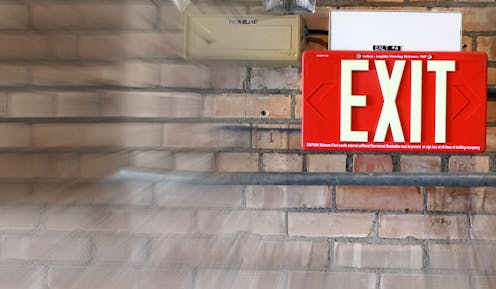Coronavirus redundancies are understandable, but there are alternatives
- Written by The Conversation

Redundancies are attractive to organisations in crisis. Although the payouts cost money upfront, they can reshape the remaining workforce to make it leaner and more fit for purpose.
On the other hand they can demoralise that workforce, and they are far from good for the rest of the economy.
One alternative, available to the employers of as many as 6.6 million Australians for the next six months, is JobKeeper.
Read more: JobKeeper is quick, dirty and effective: there was no time to make it perfect
Another is being tried with apparent success by Domain Group, the real estate listings and journalism firm majority owned by Nine Entertainment Holdings, which also owns newspapers including The Age and The Sydney Morning Herald.
Domain, and the real estate industry in general, has been hard hit by plummeting listings and plateauing home prices.
Project Zipline
Because it is part owned by the public and listed on the Australian Securities Exchange, it has had to explain its approach to shareholders.
Its April 26 announcement notes that about 45% of its cost base relates to staff and employee-related expenses.
“We had the option of taking the standard path of reducing hours, stand downs and redundancies, chief executive Jason Pellegrino explained on the Domain website.
He chose another option: Project Zipline
employees were offered the opportunity to participate in a share rights program whereby they could receive a percentage of their salary package over the next six months in share rights, or alternatively elect to reduce working hours
The target is a 20% reduction in staff costs, while retaining employee talent and "momentum for the long term”.
It’ll also help align the employees and the organisational interests.
Domain’s group director for employee experience, Rosalind Tregurtha says there has been a 90% take up of the options offered.
Sacrifices at the top
The executive leadership and board are role modelling by taking greater proportions of their own remuneration in share rights: 30% and 50%.
It has had to work quickly so the savings can start from May.
The work has included preparing information packs for managers and employees, briefing managers, asking employees to chose options, working with Link Market Services to get offers out and processing the changes for the more than 600 employees on the payroll.
Zipline is a case study of an organisation working quickly with its workers to find a solution that works.
It mightn’t work elsewhere. Other options for businesses include
offering greater work flexibility including shortened weeks and job sharing
freezing or limiting recruitment
restricting or banning overtime
increasing the scope of jobs
allowing employees to take accrued leave
directing employees to take unpaid leave under the government’s stand down provisions
seeking voluntary redundancies
Whatever option works the best, for many employers doing nothing is not an option.
Read more: Coronavirus lays bare the trauma of losing your job
It is important to consider, as Domain did, that while demand for their services might have slowed for a time, there is every likelihood that in the not too distant future things will pick up.
The firms that have done all they can to retain their industry knowledge and company experience will be the best placed for revival.














